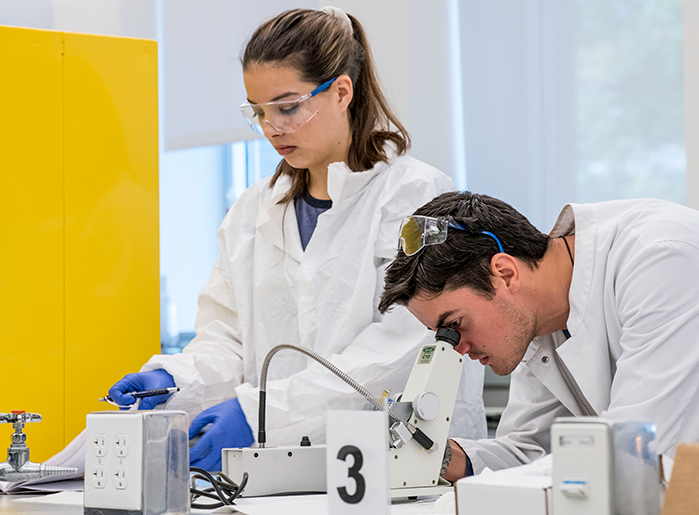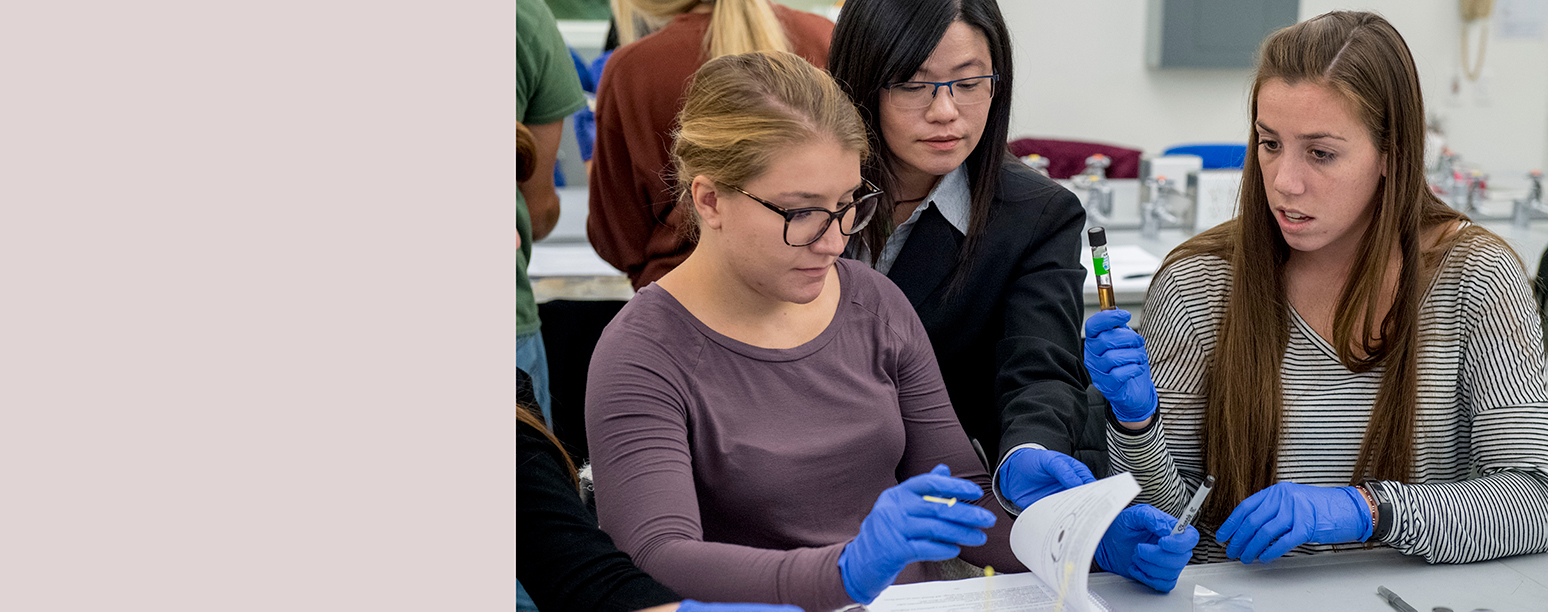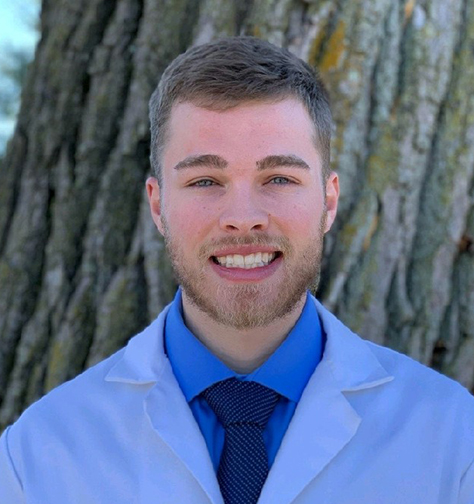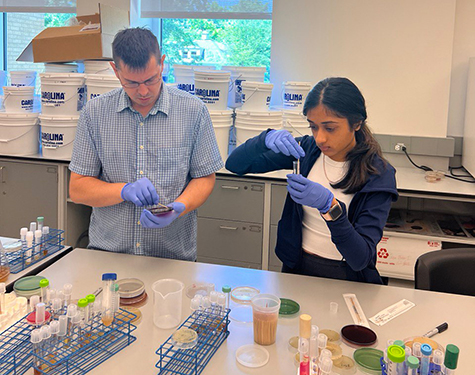College of Arts and Sciences
Imagine spearheading research that could lead to life-saving treatments or transformative medical technologies. Presenting at international conferences – or publishing in top-tier journals. With a Ph.D. in Molecular Bioscience, you can take your career to the next level and unlock new opportunities to place you at the forefront of molecular science.
Our S.T.E.M.-designated doctorate program focuses on advanced training in modern life science disciplines, including genetics, cell and developmental biology, biochemistry, microbiology, physiology, pharmacology, molecular ecology and immunology.
Our approach – a balance of coursework, research and collaboration – builds students’ confidence through comprehensive training in the latest techniques and technologies of molecular bioscience. Students work closely with faculty, mirroring the collaborative mentorship model common to both academic industry settings. Plus, our proximity to the tri-state area’s growing pharmaceutical and medical sector provides many opportunities for professional growth, mentorship and career advancement, just miles near campus.
With evening classes, the program can accommodate busy schedules with full-time and part-time courses of study. Our part-time option lets students apply what they’ve learned at work during the day and then immerse themselves in other research during the evening.
Accreditation & Awards



Admissions Requirements
To be considered for admission, applicants are required to complete our online graduate application and submit the following materials:
- Required application fee ($75, waivers available)
- Personal statement (750-1000 words)
- Resume
- Official academic transcripts
- Letters of recommendation
In addition to the general University requirements for admission to graduate studies, all Ph.D. applicants are required to submit their GRE scores.
For students in the current M.S. program at Seton Hall, credits will be given for courses taken within the Department of Biological Sciences with a grade of 3.0 or above that meet the Ph.D. course requirements. A maximum of 30 credits may be accepted towards the Ph.D. program.
For students who have obtained M.S. degrees outside the Department of Biological Sciences at Seton Hall University, courses will be evaluated and a maximum of 30 credits may be accepted towards the Ph.D. program.
Deadlines
Priority Consideration
-
Fall Semester
March 15
-
Spring Semester
September 15
Applications for the Ph.D. Molecular Bioscience program are accepted on a rolling basis; however, applicants should keep the above timelines in mind to receive priority consideration for admission, teaching assistantships and scholarship opportunities.
Curriculum Overview
The Ph.D. program offers a rigorous, research-driven curriculum comprising of 72 total credits. Students complete 21 core credits, 36-38 thesis and seminar credits and 13-15 elective credits, which provide breadth to the students’ training in their chosen subdiscipline.
This program consists of two phases: foundation coursework and dissertation research. In between, students take a comprehensive qualifying exam and select a mentor for their dissertation.
You’ll study and work inside our Science and Technology Center, McNulty Hall, where a $35 million upgrade helped build state-of-the-art research and teaching laboratories. In addition to classroom and seminar experiences, you’ll conduct research through our faculty’s programs or in collaboration with local biotechnology, pharmaceutical and academic institutions.
-
6:1
Student to Faculty Ratio in the Department
-
24
Average Students Enrolled in Program
-
1
State-of-the-Art Science and Technology Center
Career Opportunities
Thanks to a comprehensive understanding of biology at the molecular and cellular levels, graduates are better prepared for advanced roles in research and development, government, healthcare and consulting. Those with a Ph.D. can lead cutting-edge research initiatives, participate in drug discovery or manage teams working on new biotechnological advancements.
In New Jersey, with its renowned pharmaceutical industry dense with leading firms such as Bristol Myers Squibb and Johnson & Johnson, graduates can move into roles centered on innovative research, drug development or the understanding of diseases. Seton Hall’s proximity to this pharmaceutical and biotechnology hub offers students unique networking, internship and employment opportunities, invaluable for versatile and impactful careers.
Beyond the commercial sector, a doctoral degree can pave the way for a career in academia, opening the door to faculty positions, independent research or leadership roles in universities in which graduates help shape the next generation of scientists. Or, for those looking to specialize further, postdoctoral research or fellowships provide additional avenues to deepen one’s expertise in a specialized field.

280,000+
National Employment Opportunities in the Life Sciences Industry by 2033 (JobsEQ and BLS)
86.5%
Increase In Earnings For Graduates with an Advanced Degree (National Association of Colleges and Employers)
$2.9 Trillion
Economic Impact of Bioscience Industry on the U.S. Economy
Our alumni work at the best businesses around the world.
Our Faculty and Students
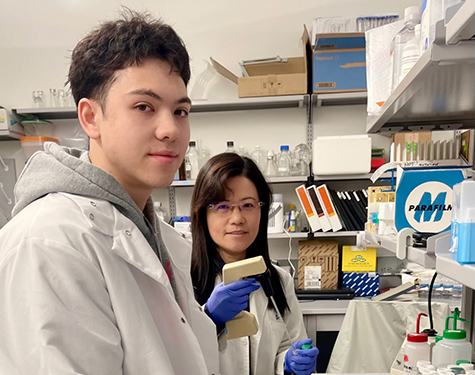
Seton Hall Faculty and Biology Student Use Undergraduate STEM Research Award to Study Antibacterial Properties of Green Tea
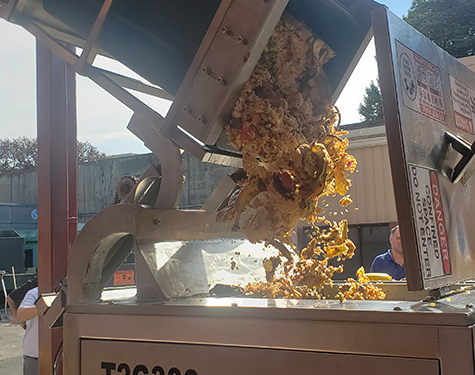
How Cafeteria Waste Is Fueling Student Research
Scholarships & Financial Aid
Seton Hall University is committed to providing students with the most current information on how to finance your graduate degree. A graduate degree is within your reach – a variety of options can help you finance your degree including scholarships, federal aid, graduate assistantships, and more.
Teaching assistantships and research assistantships, which include tuition benefits and a stipend, are also available on a competitive basis.
-
50%
Amount Scholarships Can Reduce Cost of Degree
Frequently Asked Questions
How long does it take to complete the Ph.D. in Molecular Bioscience program?
What kind of funding, scholarships or grants are available for Ph.D. students?
Where can I access additional FAQ's?
Additional Resources
STEM Connect
About Seton Hall


One of the country's leading Catholic Universities, Seton Hall University has been developing students in mind, heart and spirit since 1856.
Home to over 10,000 undergraduate and graduate students and offering more than 90 undergraduate programs and over 130 graduate programs, Seton Hall's academic excellence has been singled out for distinction by The Princeton Review, U.S. News & World Report and Bloomberg Businessweek.
Seton Hall's 58-acre campus in the quaint town of South Orange, New Jersey, is only 14 miles from New York City — offering students a wealth of employment, internship, cultural and entertainment opportunities. The University’s nationally recognized School of Law is located in nearby Newark, New Jersey. The Interprofessional Health Sciences (IHS) campus in the owns of Clifton and Nutley, New Jersey, houses the University’s College of Nursing and School of Health and Medical Sciences.
-
14
Miles from New York City
-
90+
Career-Building Graduate Programs


